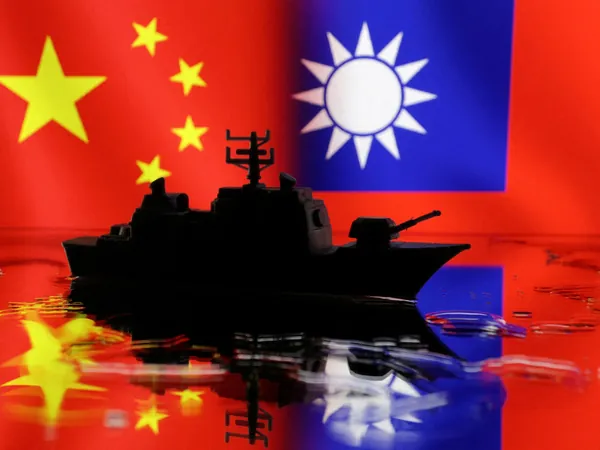
Tensions Soar as China Conducts New Military Drills Near Taiwan Following National Day Celebrations
2024-10-14
Author: Ken Lee
China's Military Drills Near Taiwan
In a bold display of military might, China's armed forces have initiated a new round of war games near Taiwan, mere days after the island celebrated its National Day on October 10. This latest exercise, dubbed Joint Sword-2024B, is reportedly taking place in "areas to the north, south and east of Taiwan island," as confirmed by Captain Li Xi, spokesman for the Eastern Theatre Command of the Chinese military.
Focus of the Drills
The drills focus on enhancing combat readiness in maritime and aerial domains, including strategies for blockading key ports and executing targeted assaults on various maritime and ground objectives. Captain Li emphasized that these maneuvers are both "legitimate and necessary" for upholding what China terms its state sovereignty and national unity.
Taiwan's Response
Taiwan's Ministry of Defence has condemned China's "irrational and provocative actions," affirming that it is prepared to respond appropriately to safeguard democracy and sovereignty. As of early morning reports, approximately 25 People's Liberation Army (PLA) aircraft and 11 naval vessels were active around Taiwan's perimeter.
Taiwan's Presidential Office Statement
Taiwan's presidential office has called on China to respect the island's democratic choice and to refrain from escalatory military actions. The fervor surrounding these military drills follows Taiwanese President William Lai Ching-te's defiant National Day address, where he vowed to resist any attempts at "annexation or encroachment" from Beijing, declaring that the Chinese government has no right to represent Taiwan's 23 million citizens.
Expert Analysis on Military Exercises
Analysts anticipated these military exercises, with Bonnie Glaser, managing director of the German Marshall Fund's Indo-Pacific program, stating that the drills serve as a reminder to both domestic and international audiences of the Chinese Communist Party's commitment to protecting what it considers its territory. The military posturing aims to warn not only Taiwan but also its allies, particularly the United States, about crossing Beijing's so-called red lines.
Speculated Diplomatic Crisis
Fears of a diplomatic crisis loom, as Beijing has not dismissed the idea of using force to bring Taiwan under its control. Chinese officials have denounced President Lai's administration as "separatist," recently conducting military drills known as Joint Sword-2024A shortly after his inauguration in May.
Political Perspectives
Political experts, like Lev Nachman from National Taiwan University, suggest that while threats from the mainland carry weight, the expected military reaction shouldn't incite panic. "We all knew the PRC would respond to Lai’s speech with a military display," he remarked, asserting that this can pass quickly without significant escalation.
Lai's Olive Branch
Despite his aggressive rhetoric, President Lai also attempted to extend an olive branch in his speech, advocating for "healthy and orderly dialogue" and expressing hopes that Beijing might assist in resolving global conflicts, including those in the Middle East and Ukraine. However, Chinese state media dismissed his overtures, labeling them as disingenuous.
Global Landscape and U.S. Support
Taiwan's situation adds to a complex global landscape, with multiple regional crises unfolding—including the ongoing Russia-Ukraine war and tensions emanating from North Korea. Experts suggest that China might view these international distractions as an opportunity to gauge global responses to its assertiveness regarding Taiwan.
Conclusion: International Community's Role
Consequently, the U.S. remains a crucial ally for Taiwan, reiterating its commitment to supporting the democratic island amidst rising tensions. The U.S. State Department voiced serious concerns over China's military drills, calling such provocative maneuvers unwarranted and a potential risk for escalating regional instability.
As military drills continue and political tensions mount, the crucial question remains: will the international community stand firm in its support for Taiwan, or will China's assertiveness redefine the status quo in cross-strait relations? Only time will tell if this situation will lead to a new chapter in Taiwan's ongoing struggle for autonomy.


 Brasil (PT)
Brasil (PT)
 Canada (EN)
Canada (EN)
 Chile (ES)
Chile (ES)
 España (ES)
España (ES)
 France (FR)
France (FR)
 Hong Kong (EN)
Hong Kong (EN)
 Italia (IT)
Italia (IT)
 日本 (JA)
日本 (JA)
 Magyarország (HU)
Magyarország (HU)
 Norge (NO)
Norge (NO)
 Polska (PL)
Polska (PL)
 Schweiz (DE)
Schweiz (DE)
 Singapore (EN)
Singapore (EN)
 Sverige (SV)
Sverige (SV)
 Suomi (FI)
Suomi (FI)
 Türkiye (TR)
Türkiye (TR)